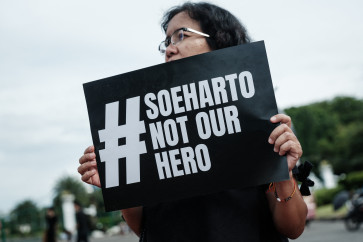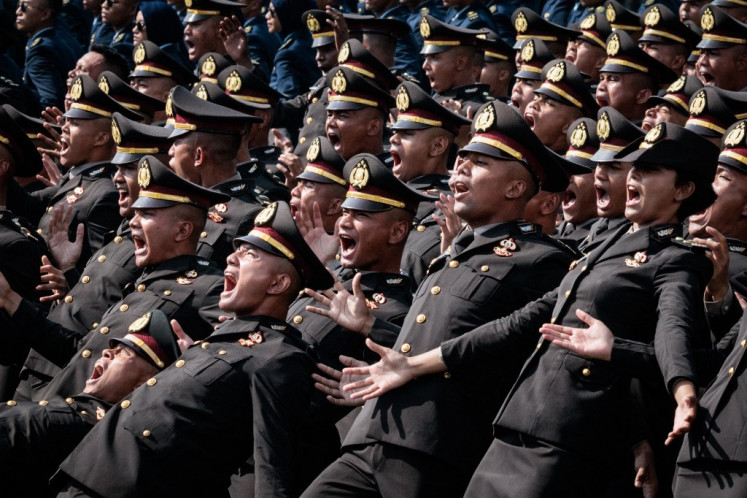Popular Reads
Top Results
Can't find what you're looking for?
View all search resultsPopular Reads
Top Results
Can't find what you're looking for?
View all search resultsIn Tune: Indonesian avant garde Noise v2
IN THE LOOP: Loop Studies by Duto Nugroho
Change text size
Gift Premium Articles
to Anyone
IN THE LOOP: Loop Studies by Duto Nugroho. (Courtesy of Duto Nugroho)
Beneath the saccharine pop and poor man’s alternative rock that permeates the Indonesian music scene lies a subsection of artists whose minds stretch beyond the usual tried-and-tested music route, creating sound art that is intimidating and appealing.
Though the history of Indonesian experimental music is relatively young, there are a host of groups and musicians that, united-in-mindset, possess expansive sound and, while the artists themselves may scoff at the thought of a “scene”, there’s no denying the basic idea shared by all – to demolish any preconceived ideas about how music should sound. For all intents and purposes, these acts have been dubbed as “experimental”, “noise”, or “avant garde” artists – a blanket description of their output.
“In the way it’s presented, ‘noise’ music serves up something atonal, or even something that can be considered ‘anti music’. People need to know that, in Indonesia, there are those who experiment with music and do so with a peculiar mindset,” says Adythia Utama, a filmmaker whom directed a documentary on the subject and who himself has released noise music under the moniker “Individual Distortion”.
A description of these acts could be endless, considering the vast array of groups. Yet, it would be fair to at least try and paint a general idea of the varied sounds.
Outside the conventional songwriting system, from the harsh electronic feedback and ear-piercing hiss of acts such as Aneka Digital Safari, Theo Nugraha and Bergegas Mati; the traditional-spiritual ghostliness of Senyawa and Zoo; the menacing-beauty of drone groups Winternight and Delusi; the high-brow sound art of Husnaan and Sawi Lieu; the chaotic experimental punk of Sangsaka Worship; to the nostalgia-drenched low-fidelity of Duckdive – there is clearly a limitless pool of sound to draw from.
For these disparate artists, inspiration and approach also casts as wide a net; from Senyawa’s use of chants to evoke the old gods, to Duckdive’s nature-centered obsession.
“I used looping pedals to create layers upon layers of melodies and textures to recapture the mood, to create new atmosphere inspired by nautical experiences,” says Muhammad “Gonzo” Fahri, the one-man band Duckdive, who feels that his music works best for people that share his oceanic and nature-centered passions.
“I think people who have experience in underwater activities might be able to relate more to the music I make, yet I don’t think that others who haven’t had those kinds of experiences won’t understand it. I just hope that my music can help them develop some sort of fascination or curiosity about nature. Maybe along the way they’ll understand how significant nature can be. Duckdive’s music is basically a representation of nature inside our heads.”
The best thing about experimental music is how evenly spread out it is. Unlike other sub-genres of underground music which stem mostly from Jakarta and Bandung, the most active experimental acts come from “smaller” cities, including Yogyakarta, Malang and Surabaya.
Rizki Aulia — who releases hypnotic electronica under the moniker Sawi Lieu and has played with Sangsaka Worship — considers evenness to be a part of the strength of experimental music. Without evoking any of the usual know-how needed to play conventional music, experimental music encourages pretty much anyone to create.
“Noise music has really grown in Indonesia,” he said, pointing out like-minded events such as the guerrilla concert series Jogja Noise Bombing.
HEAR HERE: A performance by Aneka Digital Safari. (Courtesy of Adiasa)
TALENT IN ABUNDANCE
Morgan McKeller, an Australian who recently moved to Jakarta to run tape-label Tandem Tapes, said he had been taken aback by the sheer amount of experimental musicians here.
“The first thing about the Indonesian experimental scene that stood out to me, when I began to scratch the surface, was the sheer amount and diversity of talent here. Before coming to Indonesia I was only aware of maybe two or three Indonesian experimental acts. After living here for less than a year, I’m struggling to keep up with all the great experimental music out there,” he says.
McKeller particularly admires Logic Lost which, according to McKeller “skillfully drifts between beat-oriented electronica and more ambient sounds” and Senyawa whom he said “has something very raw, brutal and powerful about their sound but also a beauty and purity to it”.
These local experimental acts tend to release limited edition albums in the form of CD-Rs and tapes on small labels or by themselves, selling them at shows, on websites and through independent distribution.
Local experimental acts are also released by foreign labels. Sawi Lieu’s worth-purchasing Pasaraya was released on US tape label Constellation Tatsu and Duckdive’s Interpolarity through Canada’s Hobo Cult records.
There has also been a barrage of compilations released locally and internationally, such as “Pekak! Indonesian Noise Music 1995-2015: 20 Years of Experimental Music from Indonesia”, released by New Zealand independent label End of The Alfabet.
“There is no vessel here for this kind of music, unlike abroad. You hardly even run into anyone who would want to play this type of music,” said Adhythia, whose music has also been released abroad by foreign labels.
The biggest global push has thus far come in the form of documentaries.
In 2014, noise musician Danif Pradana teamed up Adythia Utama and Riar Rizaldi to produce Bising (Noise) — a documentary that was screened at prestigious film festivals across the country. Last year, Vice produced a documentary on Indonesian experimental music — prompting further interest in the scene.
Of course there is the rapturous success of Senyawa, who has toured abroad, playing major festivals. Their albums have been released by prestigious foreign indie labels.
“Without belittling our own market, the ‘global community’ tend to be more open-minded, curious and supportive with what we are doing here,” says Duto Hardono, who runs the experimental label Hassana Press and releases music as Husnaan.
Yet, for these musicians, the limitless freedom that comes with creating experimental music is considered to be “success” in its purest form.
“Ultimately this kind of music gives me the total freedom to record sounds the way I want, without boundaries,” Gonzo said. “There is only the thought of mysteries, thoughts that bring a sense of peacefulness. The meeting of subtlety and chaos on the album clearly projects the message. I hope it does.”











